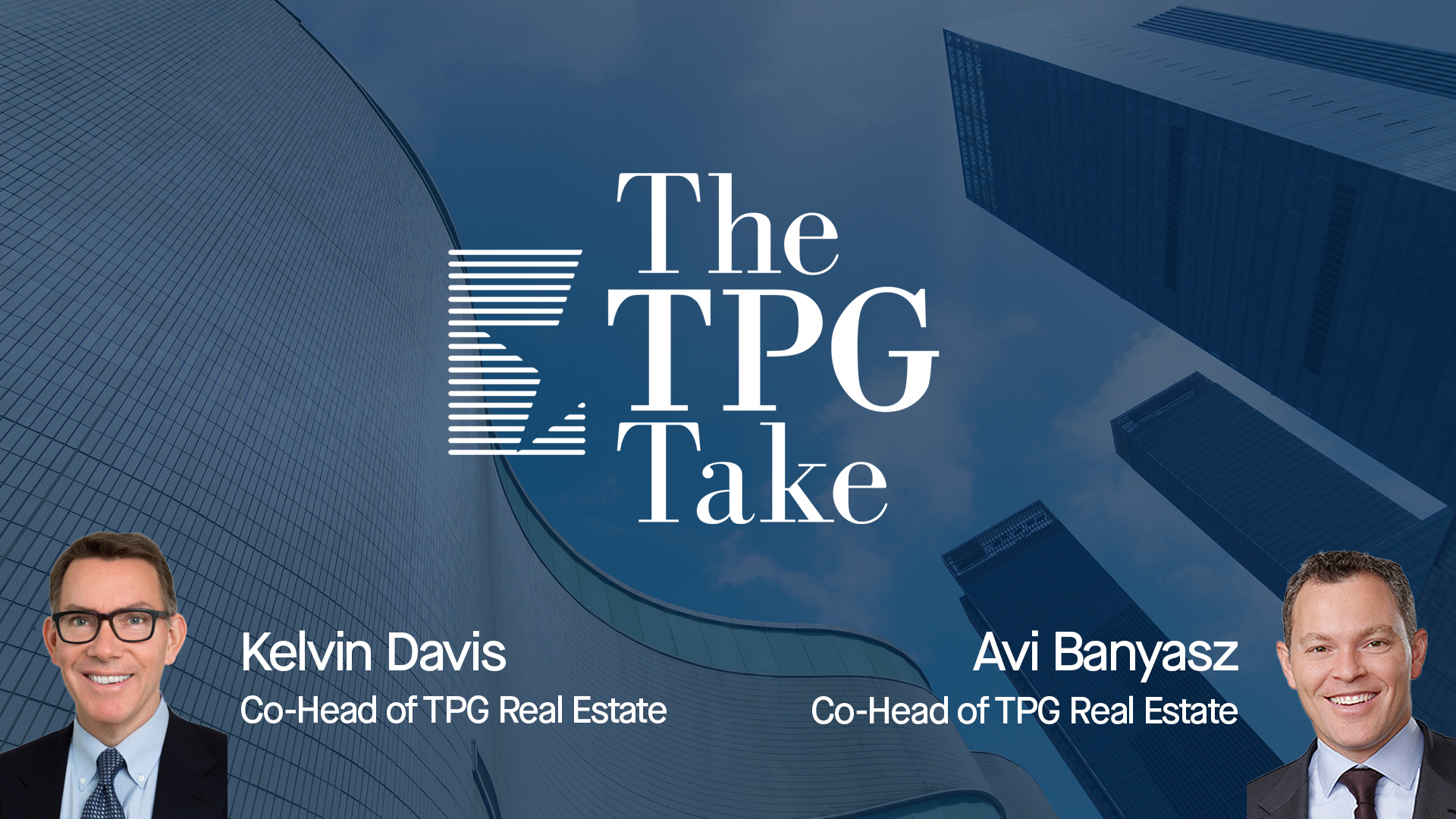
September 2024, Issue #5
Navigating the Real Estate Landscape: Perspectives from TPG Real Estate Co-Heads, Kelvin Davis and Avi Banyasz
In our latest edition of The TPG Take, we sit down with Kelvin Davis and Avi Banyasz, Co-Heads of TPG Real Estate, who discuss the themes, trends, and dislocations driving real estate markets today.
They also discuss the role of private credit in real estate investing, and how TPG’s thematic focus and investment in its people are critical to their team’s approach.
On Sector Trends Driving the Real Estate Market:
Kelvin Davis: “I've been investing around real estate for 35 years. I think one of the distinctive things we see today is a higher level of differentiation between individual real estate sectors and specific geographies than we've perhaps ever seen before. I remember early in my career in the 1990s and 2000s, real estate seemed to follow a fairly consistent pattern among the different property sectors. But today, as a result of some of these population and demographic trends, both in the United States and Europe, and certain societal or behavioral changes, we're seeing real differentiation in both the demand and supply of certain real estate sectors.”
Avi Banyasz: “It's quite an interesting investing environment. You have several sectors in real estate where I think you can rely on NOI growth over the next few years. One is probably in its first derivative of growth, and that's in the data center space, which has really nothing to do with the pandemic. It has to do with artificial intelligence. And we see data center rents escalating dramatically. We see positive growth in a few other sectors, including student housing, build-to-rent, and certain types of infill light industrial assets. Now, they're not growing as fast as they did during that period of time right after the pandemic, but they're still growing.”
Kelvin Davis: “Trends towards e-commerce accelerated in the height of COVID. These trends are profound, they're fundamental, and they're ongoing. This has dramatically changed the demand for industrial space in this country and in other countries compared to what it had been just 20 years ago. And that increased demand for industrial, candidly, has been at the expense of demand for retail.”
Dislocations Driving the Market:
Kelvin Davis: “We are in a period of dislocation where values have been under pressure, and very likely will continue to be under pressure, depending on the direction of interest rates and the overall economy over the next 12 to 18 months. It's a time to be cautious and extremely deliberate, in our view, as to where we deploy the capital entrusted to us by our investors.”
Avi Banyasz: “Real estate is a part bond and a part equity. You have a hard asset – people are paying you an income stream that you should be able to rely on – but you have the equity upside associated with rising rents and growing NOI. But that bond element of real estate, the values of that have come down because interest rates have risen. There are other impacts too. For example, in the self-storage space, people moved when they worked from home, and moved a lot of their extra things into self-storage. That has reversed. High interest rates have caused very few people to sell their houses, so we see very few home sales in America, and that also hurts the self-storage business, which benefits from people needing to move a lot. So, we've had these very interesting second derivative impacts from the pandemic, not just associated with office, but in other asset classes as well.”
Kelvin Davis: “It's gotten more complex, but I think it's actually gotten more interesting. The environment is certainly one where I think investors have the opportunity to differentiate themselves to a greater extent, because it's not so easy. It's about using all of the tools that we have from a data standpoint, the collective experience of our talented team to figure out where we can find those opportunities – even in a time of economic uncertainty – that we think are likely to outperform as an investment.”
The Role of Private Credit in Real Estate Investing:
Kelvin Davis: “Real estate fundamentally is an income-producing asset that is generally invested or acquired on a leveraged basis. It is an asset class for which leverage is critical.
The financing markets – the capital markets and their appetite for real estate – are fundamental to our ability to do what we do, and do it well. As a result, an environment of significantly rising interest rates has a profound effect on real estate across the board. Consequently, in today's environment, we are confronting an environment of lower levels of financing liquidity than we have seen in the past.”
Avi Banyasz: “As an equity investor, credit is very expensive today. It's very hard to find deals where you can buy them at cap rates higher than your total cost of leverage, which makes this environment especially challenging. So credit is expensive for buyers, and that's certainly held down values and caused values to decline. A lot of the market is expecting interest rates to decline and for that ratio to equalize into a more normalized state. The second opportunity to talk about is investing in real estate credit.”
Kelvin Davis: “We do think the opportunities are about as attractive as they've ever been because you're benefiting from an environment of significantly increased interest rates – so in effect, you're being paid more for your capital by the borrower than you were several years ago. Many of the traditional providers of that financing have retreated from the market, providing a more interesting opportunity for private credit providers.”
TPG’s Real Estate Approach:
Kelvin Davis: “For us, it's been about identifying the specific thematic areas of interest and then identifying ways in which we can invest behind those themes in scale. And that has typically taken us to operating platforms that own real estate of the particular type we're interested in, and backing management teams that are highly talented and aligned with us and our investors.”
Avi Banyasz: “We spend a lot of time focused on themes that we like investing in, and a lot of time focused on the macro, and that drives a lot of success. But that success wouldn't be full and complete if we didn't have this great culture and this phenomenal team. That really is critical to us – it’s transparent investment committees where we have open debate and teach our youngest folks on what makes interesting investments. We do a lot on mentorship and recruiting the best and most talented folks, and creating this great combination of work-life balance and investing in our people. That combination of culture and real estate investing is really what drives our performance and differentiates us.”
In Other News & Views...

We also want to "circle back" to share other recent insights from our ecosystem, senior leaders, and investing professionals that you might have missed.
In our series Partnerships in Focus, we hear directly from leaders across the TPG portfolio and ecosystem. In this episode, we hear from Dean Schauer, President & CEO of Confluent, a leading material science platform that supports the design, development, and manufacturing of life-changing and lifesaving implantable devices. Dean discusses how the company’s partnership with TPG is helping Confluent scale its platform while maintaining its culture of innovation, collaboration, and excellence.
From our investment in CAA more than a decade ago, to recently announcing the formation of a new talent management and representation company with our first investment in Untitled Entertainment, TPG has a long-established thematic focus on investing in market-leading media and entertainment assets. In this episode of Investment Insights, Business Unit Partner Jacqui Hawwa shares her thoughts on the broader content landscape and how the demand for and distribution of content continues to evolve.
Thank you to all of our followers and readers for joining us for another edition of The TPG Take. Please share the newsletter with anyone you think would be interested and we look forward to being back in your inboxes soon.

TPG
345 California St suite 3300, San Francisco, CA 94104, USA
Important Disclosures
This material is solely for informational purposes and shall not constitute an offer to sell or the solicitation to buy securities. The opinions expressed herein represent the current, good faith personal views of the author(s) at the time of publication, and do not necessarily represent the views of TPG, its affiliates, or any of its investment professionals. The opinions expressed herein are not definitive investment advice and should not be relied on as such. The information presented herein has been developed internally and/or obtained from sources believed to be reliable; however, TPG does not guarantee the accuracy or completeness of such information. We provide links to third party websites only as a convenience and the inclusion of such links does not imply any endorsement, approval, investigation, verification or monitoring by us of any content or information contained within or accessible from the linked sites. If you choose to visit the linked sites you do so at your own risk, and you will be subject to such sites' terms of use and privacy policies, over which TPG has no control. In no event will TPG be responsible for any information or content within the linked sites or your use of the linked sites. Predictions, opinions, and other information contained in this material are subject to change continually and without notice of any kind and may no longer be true after the date indicated. Any forward-looking statements speak only as of the date they are made, and TPG assumes no duty to and does not undertake to update forward-looking statements. Forward-looking statements are subject to numerous assumptions, risks and uncertainties, which change over time. Actual results could differ materially from those anticipated in forward-looking statements.
